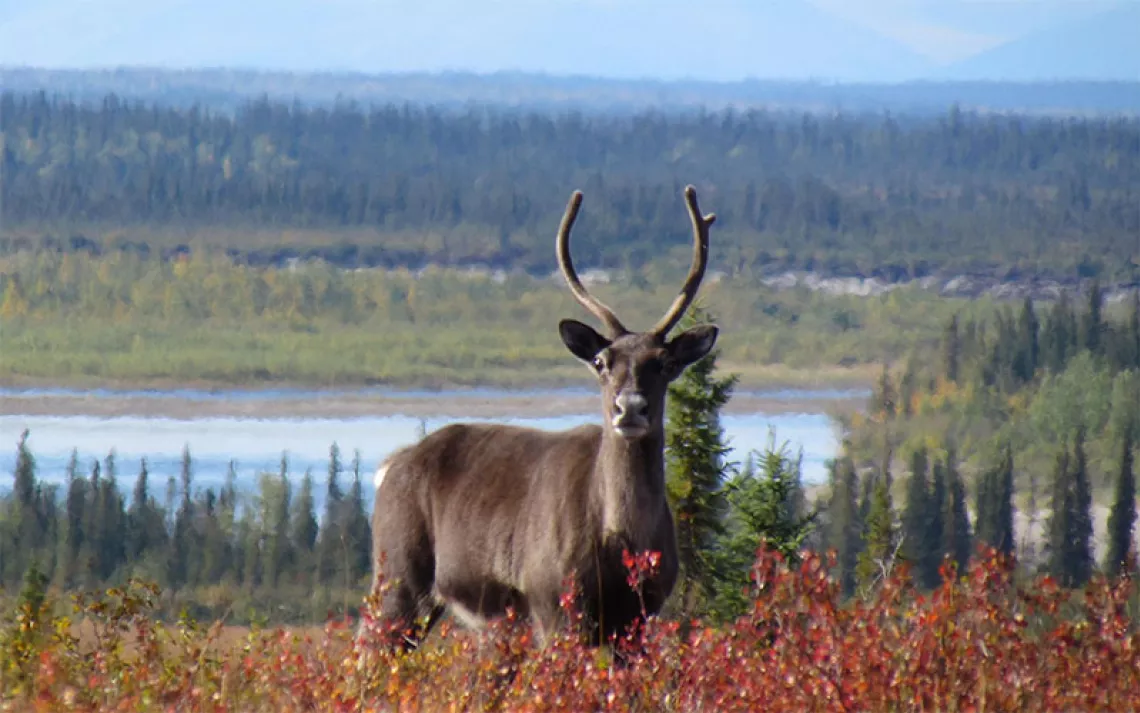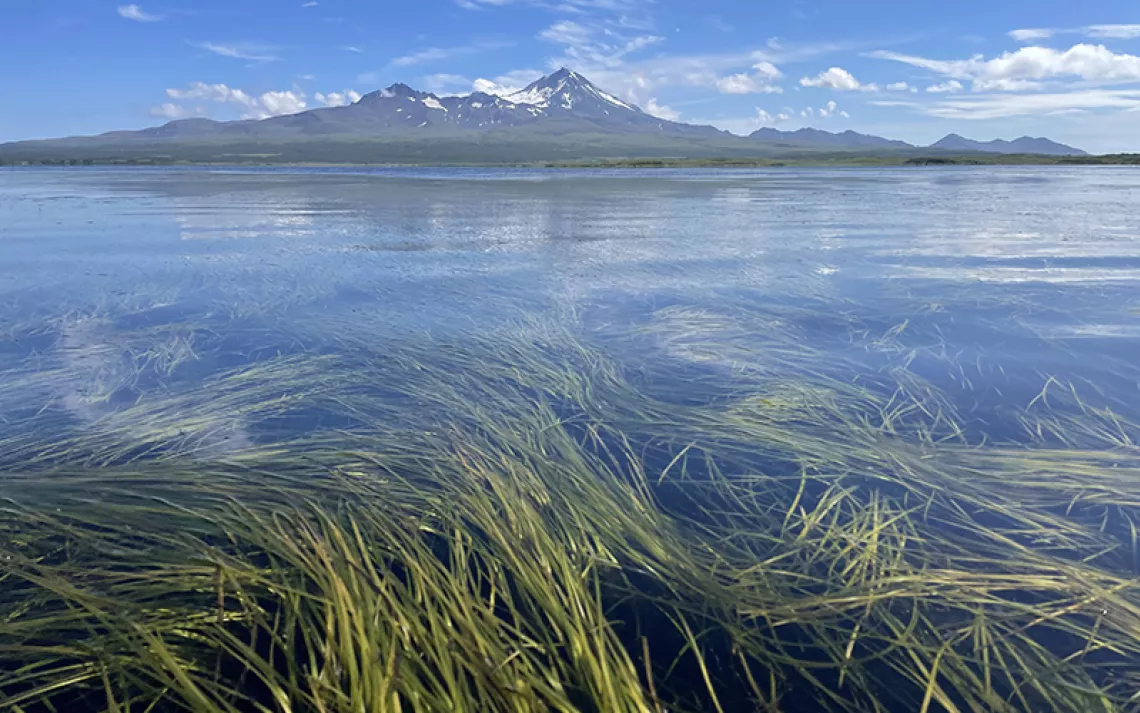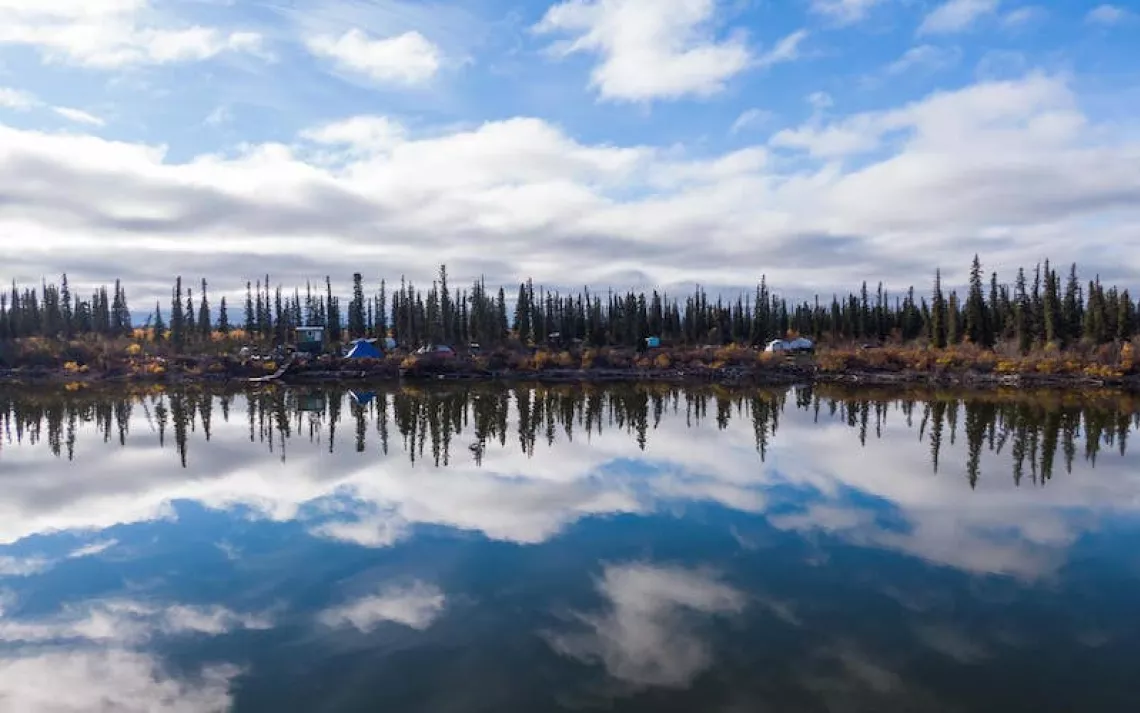Where the Tide Is the Loudest Sound
A gold mine intrudes on a quiet Alaskan refuge
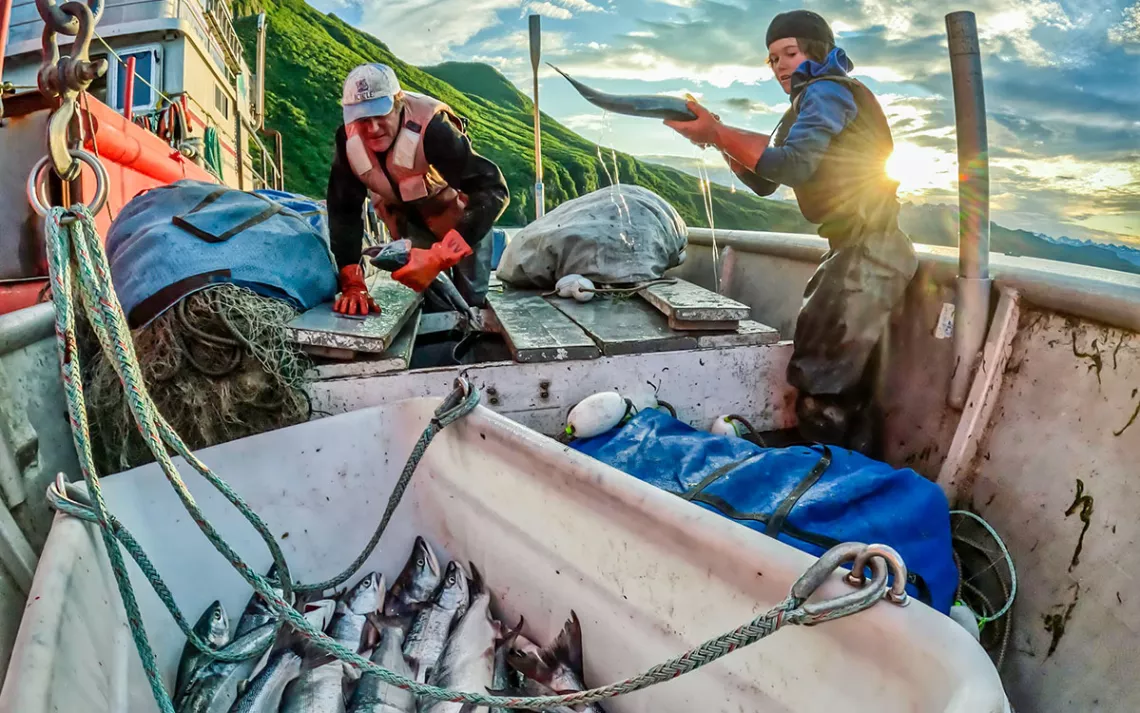
Author Dustin Solberg and his son harvest wild sockeye salmon every summer in Alaska’s Tuxedni Bay. They’re part of a community of commercial fishing families working from small boats in a fishery certified as sustainable by the nonprofit Marine Stewardship Council. | Photo by Hamish Laird
Summer days on a fishing boat in Alaska stretch on and on, luxuriously so. Twilight comes long past my bedtime, but that doesn’t mean more time. If winter is for getting ready, summer means showtime. This is when the waterfront cannery where I set out in my boat for the first day of the commercial fishing season churns with new life. It runs full tilt for as long as the sockeye are running.
In a good year, every sockeye salmon in the boat is another $10 bill, so it pays to be rested, ready, and focused, above all else, on fish. Even so, on a July morning, I steered my family’s skiff not to the fishing grounds but to a quiet island, where we jumped out of the boat and began walking and then scrambling uphill. Up to the 2,674-foot top of a sloping rock, the angle of its tilting stratigraphy revealing some great geologic drama. We climbed in a direction Hamish, my friend and guide, called direttissima. “The most directest route,” he clarified. There is no trail.
Some like to climb a summit “because it’s there.” Not me. I skipped a day of work because I wanted to stand atop Chisik Island and do nothing more than look out at Tuxedni Bay, a wild 15-mile-long nook along Cook Inlet’s west side. I tried to steel myself to picture what it might become. A mining company wants to build a big industrial port in an area called the Johnson Tract. They want to haul away the ore and offer it up for sale to a world gone mad for gold.
Even by Alaska standards, Tuxedni Bay stands out. A Dena’ina name for this place, Tuk’ezitnu, isn’t printed on the maps, but it predates them all. Pictographs on a rock wall shed a sliver of light on a long Indigenous presence here. A friend once showed me something wondrous on a Tuxedni beach: a beautiful and perfectly symmetrical oil lamp for burning what would have been the most available oil, seal oil, carved in a dark granitic stone.
Today, much of the land around Tuxedni Bay is in a national park called Lake Clark National Park and Preserve, which is fine enough, though it’s a wonder nobody named it Tuxedni Bay National Park instead. It’s quiet. There are no roads and no towns. No street lights or power lines. But there are brown bears. Wolverines. Wolves. In towering cottonwood trees, it’s easy to spot the gargantuan nests of bald eagles. Of the world’s remaining 331 endangered Cook Inlet beluga whales, many come here to feed on fish—and, scientists say, to bask in quiet refuge from a built-up world.
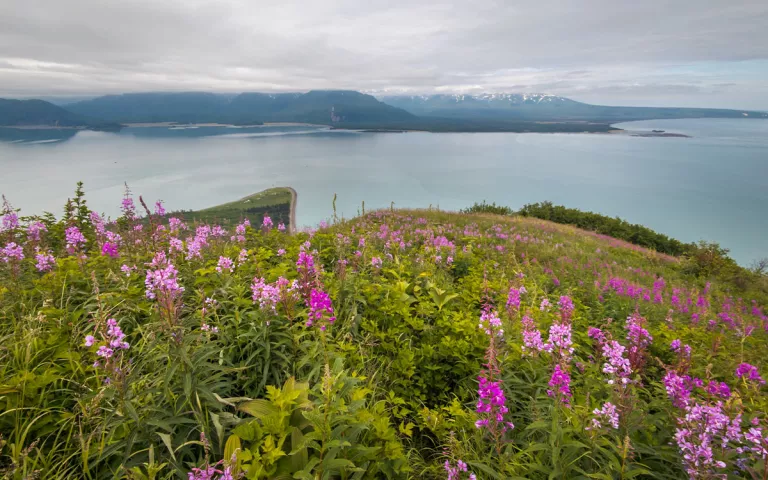
Wildflowers are in bloom near the 2,674-foot summit of Chisik Island, overlooking Alaska’s Tuxedni Bay. Tuxedni Bay, at the edge of Lake Clark National Park and Preserve, is critical habitat for endangered Cook Inlet beluga whales. Yet a gold mine proposed for an area known as the Johnson Tract inside the national park would include a major industrial port and haul road on the undeveloped shore of Tuxedni Bay, jeopardizing this quiet refuge. | Photo by Hamish Laird
In Tuxedni Bay, you can hold remnants of the Jurassic world—fossils of giant clams and ammonites that fit in the palm of your hand. On a clear day, you can watch fumaroles rise above the glaciated slopes of Iliamna and Redoubt volcanoes. You can almost feel the last ice age too, and the land most certainly can because, without the weight of glaciers, it’s rebounding and lifting at a pace people can see in a lifetime.
One person who left his mark, though, certainly never set foot here: Theodore Roosevelt. Chisik Island is part of a refuge he created in 1909 with a one-page executive order. It was an era of heightened concern for some of the continent’s more charismatic bird species, and Roosevelt believed in protecting habitat. Roosevelt’s presidential signature protected places for the seabirds that fill this otherwise infinitesimally quiet place with raucous walls of sound: Puffins, murres, and kittiwakes rule the skies here, except when peregrine falcons and bald eagles soar up along cliffside nesting colonies where the rock is white with guano.
After exactly two hours of scrambling, we arrived at the top of the island, where we discovered a little cairn of rocks and, nearby, a path worn into the alpine tundra by the platter-size feet of a brown bear. There’s scat to prove it. I looked across two miles to Bear Creek, where I knew the wild chum salmon were swimming upstream to spawn.
If the mining company gets its way, giant trucks loaded with ore will rumble down this valley. The mine would fall within the borders of Lake Clark National Park and Preserve—oddly possible because Contango Ore, the mining company, has development rights to a park inholding owned by Cook Inlet Region Inc., one of 12 regional Alaska Native corporations. We fishermen sometimes hear the company helicopters slinging loads of cargo to the exploration site up in the mountains, flying from a giant vessel that shows up for a day or two, and then, except for the trash they leave behind, they’re gone.
It’s hard to know who ought to have final say over an idea like this in a place like this. Ultimately, someone will settle on what’s to become of Tuxedni Bay and its quiet refuge. There is an Indigenous authority that exists independent of what any state or federal government says, and indeed, the Chickaloon Native Village, a sovereign Native nation, recently passed a resolution for the protection of Tuxedni Bay in Tikahtnu (Cook Inlet). The tribe resolves to “work to protect Tikahtnu traditional territory and all its fish and wildlife from the harmful ecological impacts of the Johnson Tract mine, haul road, and port.”
The Chickaloon Native Village also wants the interior secretary, who oversees public lands, including national parks, to seek alternatives to developing this gold mine. The secretary does have a lot of say in the matter. Through an act of Congress known as the 1976 Cook Inlet Land Exchange, the National Park Service—entrusted with the care of our national parks—now finds itself preparing the way for this mine.
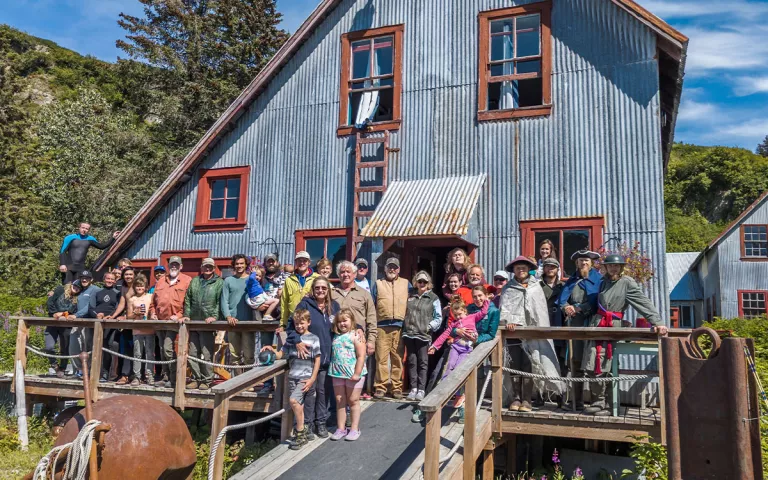
The historic Snug Harbor Cannery is a wilderness lodge on Chisik Island that continues to serve as a hub of community life for generations of commercial fishing families in Alaska’s Tuxedni Bay. The cannery was named to the National Register of Historic Places in 2023. | Photo by Hamish Laird
One decision point is happening now. After all this time, the National Park Service appears to be rushing an administrative process to provide an access easement for a haul road that would begin in the Johnson River headwaters, run through the Bear Creek Valley, and connect to an industrial port planned for Tuxedni Bay’s wild shore.
The National Park Service had signaled some semblance of public input on this matter. A comment period for the public, proposed for not a standard 90 or even 30 days but just 14 days, was scheduled for this fall. Yet now, the National Park Service appears to have canceled it entirely, closing the door on an opportunity for the American public to weigh in on the future of Tuxedni Bay. This means the interior secretary needs to hear a message from all of us, and urgently: The federal government needs to find a way to defend Lake Clark National Park and Preserve by finding an alternative to mining for gold in this national treasure.
We can’t allow a hell-bent push to allow mining in a place like this. Why bring in the noise and destruction of blasting in a place that knows no such thing? Who would want earth-rattling heavy equipment to replace brown bears? The diesel rumbling of incessant barge traffic is like nothing that’s ever visited these waters. Scientists from the National Oceanic and Atmospheric Administration describe Tuxedni Bay as “among the quietest and most pristine soundscapes” in Alaska’s vast Cook Inlet. In these silty waters, beluga mothers and calves rely not on what they can see but on what they hear. Their sophisticated repertoire of clicks and calls, essentially language, helps them to remain close to one another and find their way.
For working fishing families like mine, who know and love this place, we see what could be lost. This is where we come together to help one another and make a living. It’s a way of life built to endure through the highs and lows of the fishing season, and we know this can’t go on in a place handed over to extraction, to taking something until it’s gone. We know what it is to take from Earth’s abundance, and we honor the balance needed for it to remain.
Ours is a first-generation fishing family, but already, our young deckhand sons, who are 11 and 14, haven’t known a summer without working the tides. On our boat, when it’s time to pull in the nets, I’ll sometimes ask them to hit the lever on the hydraulics, but we’re all in on the joke: There’s no hydraulic power on this skiff. We all know the heavy lifting is up to us.
So when we pull hard on the net, a heavy load of wild sockeyes tumbles in easy. This fishing skiff may have been built to take a big load, but it can’t contain the glee of these deckhands. As far as I can tell, they’re simply thrilled to be alive. The boys toss fish on ice and tally them up in wild shouts. Their voices get swallowed up by Tuxedni’s big quiet, and, for now, there is nothing to drown out the sound.
 The Magazine of The Sierra Club
The Magazine of The Sierra Club

